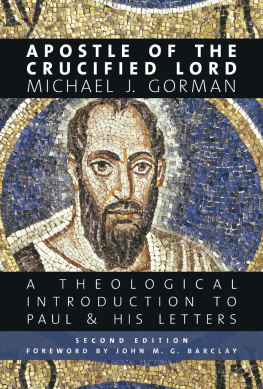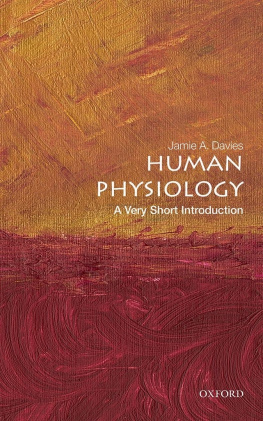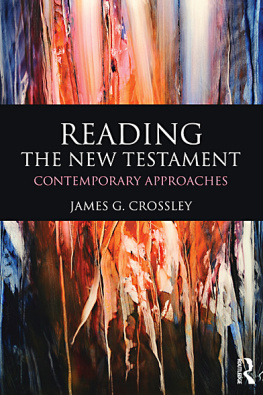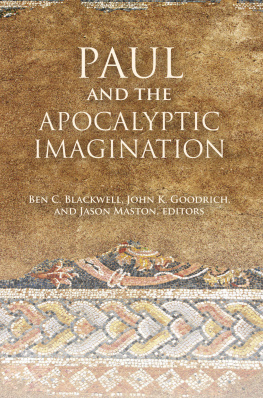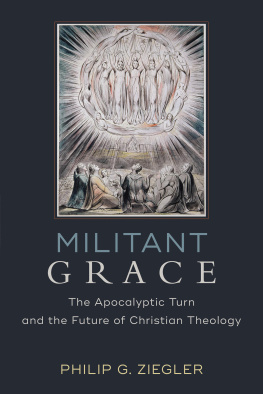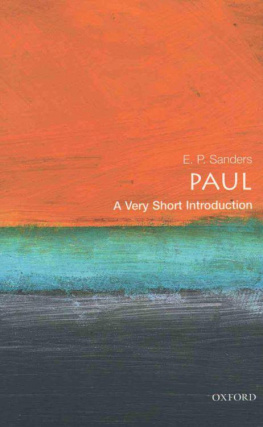The Apocalyptic Paul
Jamie Davies
foreword by John Barclay

THE APOCALYPTIC PAUL
Retrospect and Prospect
Cascade Library of Pauline Studies
Copyright 2022 Jamie Davies. All rights reserved. Except for brief quotations in critical publications or reviews, no part of this book may be reproduced in any manner without prior written permission from the publisher. Write: Permissions, Wipf and Stock Publishers, W. th Ave., Suite , Eugene, OR 97401 .
Cascade Books
An Imprint of Wipf and Stock Publishers
W. th Ave., Suite
Eugene, OR 97401
www.wipfandstock.com
paperback isbn: 978-1-5326-8192-9
hardcover isbn: 978-1-5326-8193-6
ebook isbn: 978-1-5326-8194-3
Cataloguing-in-Publication data:
Names: Davies, Jamie, author. | Barclay, John, foreword.
Title: The apocalyptic Paul : retrospect and prospect / by Jamie Davies; foreword by John Barclay.
Description: Eugene, OR: Cascade Books, 2022 | Series: Cascade Library of Pauline Studies | Includes bibliographical references and index.
Identifiers: isbn 978-1-5326-8192-9 ( paperback ) | isbn 978-1-5326-8193-6 ( hardcover ) | isbn 978-1-5326-8194-3 ( ebook )
Subjects: LCSH: Bible. Epistles of PaulCriticism, interpretation, etc.History. | Bible. Epistles of PaulTheology. | EschatologyBiblical teaching. | Paul, the Apostle, Saint.
Classification: BS2650.2 D385 2022 ( print ) | BS2650.2 ( ebook )
Table of Contents
Cascade Library of Pauline Studies
The aim of the series is to advance Pauline theology by publishing monographs that make original scholarly proposals in conversation with existing scholarly debates, and which have the potential to shape future trajectories in research.
As both the title of the series and the list of categories above suggests, it is their contribution to critical discussion of Pauline theology that will be the hallmark of books published in CLPS. However, the nature and scope of Pauline theology is intended to be understood in a somewhat expansive manner, with an openness to the use of methodologies (e.g. social-scientific or post-colonial approaches) that have sometimes been regarded as standing in opposition to theological modes of Pauline interpretation. The criterion by which the suitability of a study for inclusion in the series will be assessed is its theological interest. This judgment will be made on the basis of the potential benefits of a particular approach or methodology for our understanding of Pauline theology rather than on the basis of conformity to pre-conceived ideas of what constitutes an appropriately theological approach to Pauline interpretation. As such, CLPS will also be open both to studies that are broadly confessional in tone and to those that are more critical of perspectives expressed in the Pauline texts.
For Grant Macaskill
who taught me the intellectual virtues this book tries to practice
and who got me into this mess in the first place
Series Introduction
F or the apostle Paul, his own significance rested entirely on his commission as an apostle and his proclamation of the gospel of Christ (by the grace of God, I am what I am, 1 Cor 15:10). For this reason, the heart of Pauline studies must lie in Pauls exposition of this gospel, which is to say his theology, as it comes to expression in his surviving letters. Here Paul expresses both his deepest convictions about the significance of Jesus Christ and his perspectives on their embodiment in the life of early church communities. The Cascade Library of Pauline Studies (CLPS) will focus squarely on engagement with the theological content of the Pauline letters, along with its impact on human thought and behavior throughout the centuries. The series aims to provide a home for research efforts that produce fresh insight into Pauls theology in its original contexts, its legacies and reception, and its significance today; efforts that therefore possess the potential to shape trajectories in future research.
To stake such a claim for the centrality of Pauline theology within its discipline implies both something about the current state of Pauline studies and also an aspiration for its future. For the discipline is simultaneously marked by impressive vitality and by fragmentation. A wide range of theoretical approaches are employed, and even among those adopting a more traditional approach, the list of different frameworks within which Paul is understood is substantial: the apocalyptic Paul, the covenantal Paul, the Paul of the New Perspective, the Paul of the Old Perspective, Paul within Judaism etc. It is easy for the scholarly discourses which result to feel like separate conversations. Forums are needed within which a shared focus on Pauls theological ideas can stimulate new thinking, promote dialogue, and help to map pathways forward beyond the reassertion of incommensurate conclusions. CLPS aims to provide such a forum.
Yet an insistence on the centrality of Pauline theology within Pauline studies ought not to mean imposing a forced uniformity or understanding the scope of Pauline theology in a narrow manner. For one thing, engagement with the theological content of Pauls message is impossible without the careful historical work necessary to understand Pauls ideas in their own ancient contexts. The study of Pauline theology cannot be advanced by the erection of artificial divides between theological and historical approaches to interpretation. Neither can our attempts to understand Pauls ideas in their own ancient contexts be detached from the influence upon us of our own historical location as interpreters. We are impacted both by previous traditions of interpreting Paul and by our own social and cultural contexts. They shape our concerns, and they both enable and constrain our understanding of the past. Implicit in even the most historical approaches to the study of Pauline theology are present day questions and horizons. Some theological interpreters simply take account of the impact of historical location upon their task, keeping their focus on Paul in his own time and place. Others instead embrace the constructive task of explicitly recontextualizing Pauls theology for contemporary readers, connecting the historical study of Pauls ideas in varied ways with the Christian tradition today.
There is thus considerable and appropriate diversity within the study of Pauline theology. For this reason, exegetical studies, studies comparing Pauls ideas with those of others in the ancient world, studies exploring Pauls ideas in their canonical contexts, studies of reception history, and studies bringing Pauls theological ideas into dialogue with contemporary theological concerns are all welcome within CLPS. Some of these types of studies may employ analytical tools drawn from the Christian theological tradition. Their methodology will be theological as well as their content. However, engagement with the theological content of Pauls message can also sometimes be served by inter-disciplinary methodologies that have not typically been understood as theological or have even been understood by some of their practitioners as antithetical to theological interpretation. Post-colonial interpretation, the use of various forms of political philosophy that prioritize liberation, and various kinds of feminist interpretation all provide examples of such inter-disciplinary methodologies. Where studies use such methodologies to engage with Pauls theological ideas or to recontextualize them for the contemporary world they too will be welcome within CLPS. It is the kinds of questions asked, the quality of the theological reflection offered, and the depth of critical engagement that we intend to be the hallmark of CLPS.



